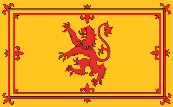
| 
| 
|
|
| TCU in Scotland:
The Search for Genius
|
|

A total of  people have loaded this since 10/10/96.
people have loaded this since 10/10/96.

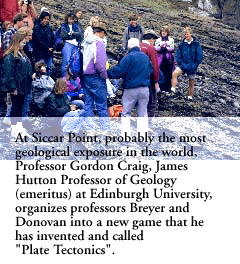
 What Re-experience the intellectual excitement of the Scottish Enlightenment - including the lives and works of Robert Adam, Joseph Black, David Hume, James Hutton, Adam Smith, and James Watt - from the perspectives of Architecture, Geology, History and Psychology.
What Re-experience the intellectual excitement of the Scottish Enlightenment - including the lives and works of Robert Adam, Joseph Black, David Hume, James Hutton, Adam Smith, and James Watt - from the perspectives of Architecture, Geology, History and Psychology.
 Where? Stay in Edinburgh - the City of Light - and visit Glasgow, Iona, and the Scottish Highlands on field trips.
Where? Stay in Edinburgh - the City of Light - and visit Glasgow, Iona, and the Scottish Highlands on field trips.
 Who? TCU students, TCU faculty and families, as well as participating faculty from the University of Edinburgh.
Who? TCU students, TCU faculty and families, as well as participating faculty from the University of Edinburgh.
 When? For three weeks this coming summer, from July 5th to July 26th, 1996.
When? For three weeks this coming summer, from July 5th to July 26th, 1996.
 Why? For the greatest educational experience of your college years - and TCU UCR credit, of course!
Why? For the greatest educational experience of your college years - and TCU UCR credit, of course!
 How? Sign up with:
How? Sign up with:
- Nowell Donovan (Geology)
- John Breyer (Geology)
- Jane Kucko (Design and Fashion), or
- David Cross (Psychology).

Program Philosophy
 We offer this program guided by the following principles:
We offer this program guided by the following principles:
- Whenever possible, teaching and learning should take place in a stimulating environment; the context of education can be as important as the content.
- Teachers and learners should not be strangers to one another; their mutual understanding and respect is the foundation for instruction.
- It is better not compartmentalize education; multiple disciplines create synergy and enthusiasm for teaching and learning.
- It is perilous to ignore the history of one's discipline; rather, understanding the past gives one a vision for the future.
- It is inspirational to study the geniuses our Western heritage; they illuminate our own pathways to understanding.
- Teachers and learners are part of the same fellowship, attempting to fathom the mysteries of nature and creating a enduring legacy for the future.

Program Design
- Phase One: Preparation (April-June)
- *Coordination of travel plans, getting acquainted, working out practical problems.
- * On Saturday, April 19th a day-long seminar (refreshments provided) will introduce the search for genius, the geography and history of Scotland, and history of the Scottish Enlightenment.
- * Students should meet with their individual professors to discuss course assignments, obtain course materials, and begin planning an individualized course of study.
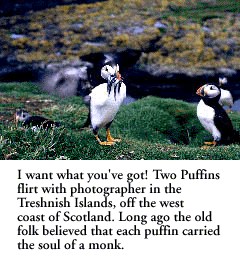
- Phase Two: Scotland (July)
- * Once in Scotland, all students participate in a multi-disciplinary program that focuses on the achievements of the Scottish Enlightenment - a period that saw the formulation of basic concepts underpinning the scientific, technological, and political accomplishments of Western Europe and North
America.
- * Teaching formats will include a mixture of lectures, seminars, and activities, led by TCU and Edinburgh faculty. There will be numerous field trips (see Calendar).
- * Students will be required to keep a log of their experiences.
- Phase Three: Conclusion (August-November)
- * Back in the USA, students will complete substantial research papers under the direction of the instructor of their choice. While the precise content of this paper will be determined by the individual student and instructor concerned, the general theme should reflect the program focus.
- * Where required by the "Writing Emphasis" guidelines of the University, papers will be evaluated and returned to students for revision.
- * The papers are due in their final form during the fall 1996 semester, at which time there will be a reunion to reflect on our search.
Important Notice
Students may enroll in more than one of the TCU-in-Scotland courses; in addition, you can "extend" a course with an independent study. In this way students can earn three or six course credits for TCU-in-Scotland. (Further, students could arrange for additional independent study once we return to the USA.) Complete course descriptions can be found below.

Courses of Study
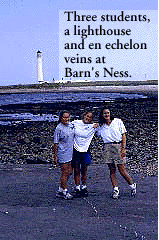
- Geology 3233: The Rock Cycle
- * Professors Breyer & Donovan
- * UCR Credit: PS-L & W
- Geology 3203: Genesis & Geology
- * Professors Breyer & Donovan
- * UCR Credit: CI & W
- Design & Fashion 4970: History of Interiors & Architecture
- * Professor Kucko
- * UCR Credit: W
- Psychology 4513: Creativity and Enlightenment
- * Professor Cross
- * UCR Credit: W

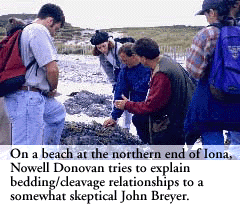 Geology 3233: The Rock Cycle
Geology 3233: The Rock Cycle
Instructors: R. Nowell Donovan & J.A. Breyer
Prerequisite: GEOL 1113 or permission of instructor
Much of what geologists do involves work outdoors. Problems of scale prevent many geologic phenomena and processes from being studied in the laboratory. Rocks exposed in mountain gorges and the slow accumulation of sediment on the inside of a river bend are the stuff of geology. One needs to see these things in context to appreciate them. For example, all students who take a course in geology are expected to learn to recognize basalt. However, a small piece of black rock in a cardboard tray (as presented in the normal "lab" experience) conveys little of the feeling of a volcanic eruption; the thirteen basalt flows of the extinct basaltic volcano of Arthur's Seat in Edinburgh carry a much more dramatic message.
This three credit hour course is designed to provide the opportunity to "do geology" in the field. To receive credit for this class while participating in TCU in Scotland - the Search for Genius, you must:
- attend a pre-trip seminar in late April:
- keep a field notebook in which you will record your observations;
- write a report on processes taking place inside the earth;
- write a report on processes taking place on the surface of the earth.
Both reports must be at least 1,000 words long, and must incorporate material from the geological literature as well as from your own fieldwork. Both reports will be evaluated and returned to you with suggestions for improvement. You must then rewrite and resubmit them.
Grades: The grade you receive will be based on your field notebook (40%), and the two written reports (30% each).

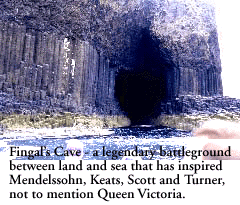 Geology 3203: Genesis & Geology
Geology 3203: Genesis & Geology
Instructors: John A. Breyer & R. Nowell Donovan
Prerequisite: GEOL 1113 or permission of instructor
The workings of science and scientists are considered by examining the emergence of geology as a science in the 18th and 19th centuries, including the demise of scriptural authority and the development of the concepts and methods that underpin the practice of geology today.
To receive credit for this course while participating in TCU-in-Scotland you must:
- attend a pre-trip seminar in late April;
- complete three writing assignments;
- participate in discussions of reading assignments.
The minimum length of each writing assignment is one-thousand words. You will have considerable freedom in choosing topics, but you must get approval from an instructor before you begin. All papers will be returned to you with our comments. You must then rewrite the papers and resubmit them on or before October 30. Each paper is worth 30% of your final grade. In addition, you are required to keep a daily journal that records your thoughts and reflections on your discussions, your readings, and the TCU-in-Scotland experience. This is worth 10% of your grade.

DEFA 3473: History of Interiors & Architecture
Instructor: Jane Kucko
Prerequisite: Sophomore Composition or permission of instructor
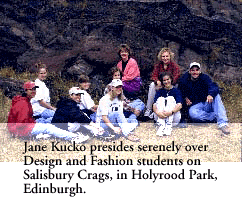 To receive credit for this course while participating in TCU-in-Scotland you must:
To receive credit for this course while participating in TCU-in-Scotland you must:
- complete a portfolio which documents the historic styles of architecture and interiors (sketches, photographs, post cards, and other forms of illustrations may be used) from antiquity to the turn of the 20th century. Specific criteria for the portfolio will be provided. The instructor will also provide visual examples as a suggested format.
- write two, 1000 word papers on specific topics provided throughout the duration of the course (for example, role-play a master mason working on a 12th century castle, or write a letter to a loved-one describing the life and times of the middle ages and your responsibilities).
- maintain a daily journal that reflects on your experiences throughout the study abroad program. Particular attention should be placed on the built environment with written and visual documentation illustrating the history of architecture and interiors. Students should utilize the journal as their personal tool for recording their experiences, and for responding to specific writing assignments.
- participate in class discussions and on-site tours
Grades: Your grade will be determined by your performance on the portfolio (50%), performance on the two papers (30%), and the journal (20%). Students will be expected to meet with the professor to discuss their progress on the papers and the portfolio. Due dates for the two papers will designated during the program; the portfolio and journal will be due October 1, 1997.

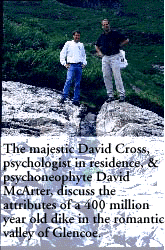 Psychology 4513: Creativity & Enlightenment
Psychology 4513: Creativity & Enlightenment
Instructor: David Cross
Prerequisite: PSYC 1213, 1514, or 1524 or permission of instructor
Creativity and genius have been intensely studied by psychologists since the beginnings of our science. Recently, important advances have been made utilizing the knowledge and methods of developmental, social, and cognitive psychology. It is the purpose of this course to apply these new ides to the Scottish Enlightenment and its consequences for Western Civilization, including the United States. Although the central focus of this course is on the achievements and central figures of the Scottish Enlightenment, students have considerable flexibility in how they approach this topic. No matter what approach you take, you will be required to complete the following assignments:
- attend a pre-trip meeting on Saturday, April 19th, 1997;
- write a background on some aspect of creativity (1,000-1,500 words);
- participate in small-group discussions and whole-group activities;
- keep a journal of your notes, reflections, & observations while in Scotland;
- write an investigative paper on the creativity applied to the Scottish Enlightenment (2,000- 3,000 words).
The background paper is due on or about July 1st, and the revision is due on or about September 1st. The journal and investigative paper are due on or about November 1st, and the revision of the investigative paper is due December 1st, 1997. You will receive considerable guidance when choosing a topic and tracking down sources for your papers.
Grades: Participation and the background paper will each be worth 20% of your grade; the journal and investigative paper will each be worth 30% of your grade.

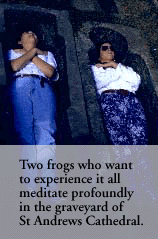
Program Mechanics
What does it cost you?
There are four categories of expenses associated with TCU-in-Scotland:
- Program Cost - $2,600
- TCU Tuition - based on June 1, 1997 rates
- Airline Ticket - varies, but typically about $800
- Pocket Money - up to you, but take at least $300
What do you get for your money?
The Program Cost ($2,600) includes room and board while in Scotland, as well as ground transportation costs and entry fees for all of the field trips. The field trips include tours of abbeys, castles, palaces, museums, as well as the Island of Iona. Participating students also receive numerous publications distributed solely to TCU-in-Scotland students, as well as the highly prized program t-shirt!
How do you sign up?
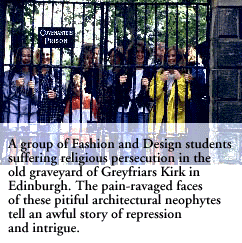
Talk to one of the faculty - Breyer, Cross, Donovan, or Kucko - as soon as possible. Alternatively, you can talk to Mary Alice Oatman in the Office of Continuing and Extended Education. Be sure to ask Mary Alice or one of us about the financial aid that is set aside strictly for study abroad students!

 [Geology Home Page]
[Geology Home Page]
 [Donovan]
[Donovan]
 [Breyer
[Breyer

This page created 10/9/96 by Art Busbey with text from R. Nowell Donovan.
This page last revised 10/28/96
Copyright © 1999 - Texas Christian University
Maintained by
Art Busbey.











![]() What Re-experience the intellectual excitement of the Scottish Enlightenment - including the lives and works of Robert Adam, Joseph Black, David Hume, James Hutton, Adam Smith, and James Watt - from the perspectives of Architecture, Geology, History and Psychology.
What Re-experience the intellectual excitement of the Scottish Enlightenment - including the lives and works of Robert Adam, Joseph Black, David Hume, James Hutton, Adam Smith, and James Watt - from the perspectives of Architecture, Geology, History and Psychology.![]() Where? Stay in Edinburgh - the City of Light - and visit Glasgow, Iona, and the Scottish Highlands on field trips.
Where? Stay in Edinburgh - the City of Light - and visit Glasgow, Iona, and the Scottish Highlands on field trips.![]() Who? TCU students, TCU faculty and families, as well as participating faculty from the University of Edinburgh.
Who? TCU students, TCU faculty and families, as well as participating faculty from the University of Edinburgh.![]() When? For three weeks this coming summer, from July 5th to July 26th, 1996.
When? For three weeks this coming summer, from July 5th to July 26th, 1996.![]() Why? For the greatest educational experience of your college years - and TCU UCR credit, of course!
Why? For the greatest educational experience of your college years - and TCU UCR credit, of course!![]() How? Sign up with:
How? Sign up with: We offer this program guided by the following principles:
We offer this program guided by the following principles:

 Geology 3233: The Rock Cycle
Geology 3233: The Rock Cycle Geology 3203: Genesis & Geology
Geology 3203: Genesis & Geology To receive credit for this course while participating in TCU-in-Scotland you must:
To receive credit for this course while participating in TCU-in-Scotland you must: Psychology 4513: Creativity & Enlightenment
Psychology 4513: Creativity & Enlightenment


